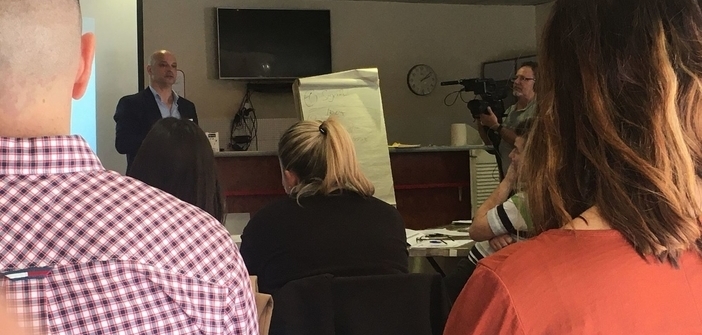On Wednesday, February 12, the first training session on radicalization was held. Sports organizations in the region gathered at the Henri-Bernard boulodrome in Nice. Under the instruction of doctoral candidate Médéric Chapitaux, the various stakeholders were studious.
The room was full, with those present captivated by their professor’s lecture. A studious class, composed of local sports actors, but not only that. Many associations, whether social or cultural, were also present for this initial training session.
Under the impetus of the Departmental Olympic and Sports Committee (CDOS 06), Médéric Chapitaux, a specialist on the subject, was invited to share his knowledge. In a region affected four years ago by terrorist attacks, the initiative was well received. There was strong demand from sports clubs, which were hoping for support on the issue. A sensitive topic, often in the headlines, and a central issue in the Western world, radicalization affects our society, and sports are no exception. “Today I learned everything about the subject. We were well trained; now we need to spread the right reflexes. It’s a topic we might encounter, and we have to be prepared.”
This is the sentiment of Frédéric Lafleur, president of the departmental fencing committee. A sentiment shared by the entire assembly.
“We can no longer say we didn’t know”
This was the sentiment in the room after a morning of lectures on radicalization, essential for a good understanding and to avoid any confusion. During the afternoon, the students moved to practical cases. In groups of six, participants had to make decisions on concrete cases. Real-life cases of individuals who exhibited alarming behavior, some of whom acted on these behaviors.
Each group had its perception of the matter, and Médéric Chapitaux would go around the tables, explaining the outcomes of the cases. The case of the entrepreneur in Isère found decapitated was a striking example. The instigator of the terrorist act, with adequate training, could have been identified beforehand. The example horrified and frustrated an attentive and willing audience.
For Brenda, an instructor in Cannes, this exercise was a revelation. “Thanks to the morning explanations, I was able to understand and analyze a person’s past and report them if necessary. It’s a real advancement; without this training, I would never have known.”
Her colleague, Jennifer, agrees, “now we know how to detect signs of radicalization, and this will help us in our daily lives.”
And now?
With their certificate in hand and skills acquired, everyone returns to their activities, now informed about radicalization. For many, this day will change their daily lives. “Today I understood that the prevention of radicalization is completely different from other forms of prevention. Now, I know that before launching an educational action towards someone suspected of derailing, I must have the reflex to report to the competent authorities and act after receiving their feedback,” explains Margaux Ravary, project coordinator for the Montjoye association (an association against delinquency).
From now on, everyone has received a notification form, which serves as a guide to identify signals, transcribe them, and thus send a clear and concise report to the general intelligence services.



